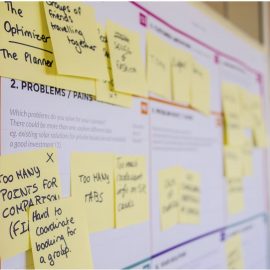

This article is an excerpt from the Shortform book guide to "Trailblazer" by Marc Benioff and Monica Langley. Shortform has the world's best summaries and analyses of books you should be reading.
Like this article? Sign up for a free trial here.
Do stakeholders have high expectations for your business? How can you keep your stakeholders happy?
Principled business is a form of stakeholder capitalism, which means businesses that take this approach must meet all their stakeholders’ diverse needs. Salesforce satisfies the interests of three major groups of stakeholders: employees, society, and the environment.
Find out how to manage stakeholders’ expectations by modeling your business after Salesforce.
1. Improve the Well-Being of Employees
Marc Benioff explains that Salesforce knows exactly how to manage stakeholders’ expectations. Salesforce takes pains to foster employee well-being because vibrant employees are more engaged and productive, so they can better support the company’s principled business efforts. In his view, Salesforce employees comprise the company’s “ohana” (the Hawaiian word for family—Benioff says he feels connected to Hawaiian culture because he’s vacationed there his whole life, so he infuses Salesforce with aspects of it). Let’s discuss two measures Salesforce uses to make employees feel like family: paid volunteerism and opportunities for mindfulness.
Salesforce offers employees seven paid volunteer days per year. Employees can volunteer for any cause in whatever capacity they want; for example, many employees volunteer in an educational capacity, providing mentorship and skills training to children in underserved schools, because they find such work emotionally rewarding. Benioff says paid volunteerism improves employee engagement, helps employees form meaningful relationships with people they care about, and reinforces employees’ sense of contributing to something large and worthwhile (Salesforce’s extended family). It also benefits the company—offering this benefit helps Salesforce attract and retain talented, compassionate employees.
Salesforce also makes mindfulness an essential part of the Salesforce work experience. Benioff describes mindfulness as a Buddhist practice he learned from Vietnamese Buddhist monk Thich Nhat Hanh that is centered around the breath, promotes understanding without judgment or projection, and supports mental wellbeing. To demonstrate its genuine care for employees, Salesforce incorporates mindfulness into their lives by offering a space for mindfulness on every floor of each of its offices that employees can use to meditate or pray. Benioff also encourages employees to practice mindfulness before they set their yearly work goals, since beginning with a clear mind can help them set more meaningful, achievable, value-oriented objectives.
2. Addressing Social and Environmental Needs
Benioff considers society and the global environment two of Salesforce’s chief stakeholders. One way Benioff says Salesforce meets societal needs is through its 1-1-1 program: In addition to promoting employee volunteerism, Salesforce Foundation donates 1% of its money and resources like computers to communities in need. It also encourages other corporations to follow suit via its Pledge 1% campaign. As for the environment, Benioff says Salesforce is improving the sustainability of its operations and donates employee time to environmental causes.
Benioff also explains that as the impactful leader of a large, successful corporation with a wealth of resources at his disposal, he feels compelled to proactively address stakeholders’ problems in his personal life. This compulsion has led him to take personal responsibility for addressing social and environmental problems—he hopes that by demonstrating the power CEOs have to steward society and the environment, he’ll set an example for other business leaders and inspire them to get involved. He’s involved in traditional philanthropy—for example, he founded the Benioff Ocean Initiative to fund marine conservation research—which is common for CEOs, but he takes his responsibility a step further by campaigning for political change.
Benioff describes two times when he campaigned for political change. First, in 2015, Indiana passed a law that could allow businesses to legally turn away LGBT customers on the basis of religious freedom. After employees expressed fear about how the law would impact their lives, Benioff announced on Twitter that Salesforce would reduce its heavy involvement in Indiana, diverting funds from the state’s economy. Benioff says that his outspokenness emboldened other CEOs to take similar stance and eventually, the economic pressure these companies exerted convinced the state to revise the law, clarifying that it couldn’t be used to justify anti-LGBT discrimination.
Benioff campaigned for political change again by advocating for San Francisco’s Proposition C, a 2018 effort to impose a tax on the city’s largest corporations to fund services for the homeless, which many business leaders lobbied against. Benioff explains that the technology sector, including Salesforce, was partially to blame for the city’s growing homelessness problem—by locating there to take advantage of tax cuts, they drove up housing costs, which exacerbated homelessness, a problem that creates mass suffering, social strife, and unsafe, unsanitary street conditions. Benioff says he generated publicity for the cause by getting into a public disagreement with Twitter founder Jack Dorsey about it, which helped the proposition pass.

———End of Preview———
Like what you just read? Read the rest of the world's best book summary and analysis of Marc Benioff and Monica Langley's "Trailblazer" at Shortform.
Here's what you'll find in our full Trailblazer summary:
- What “principled business” means and why it matters to you
- The priority that Salesforce—a Fortune 500 company—puts before profit
- How capitalism can look different in the future






